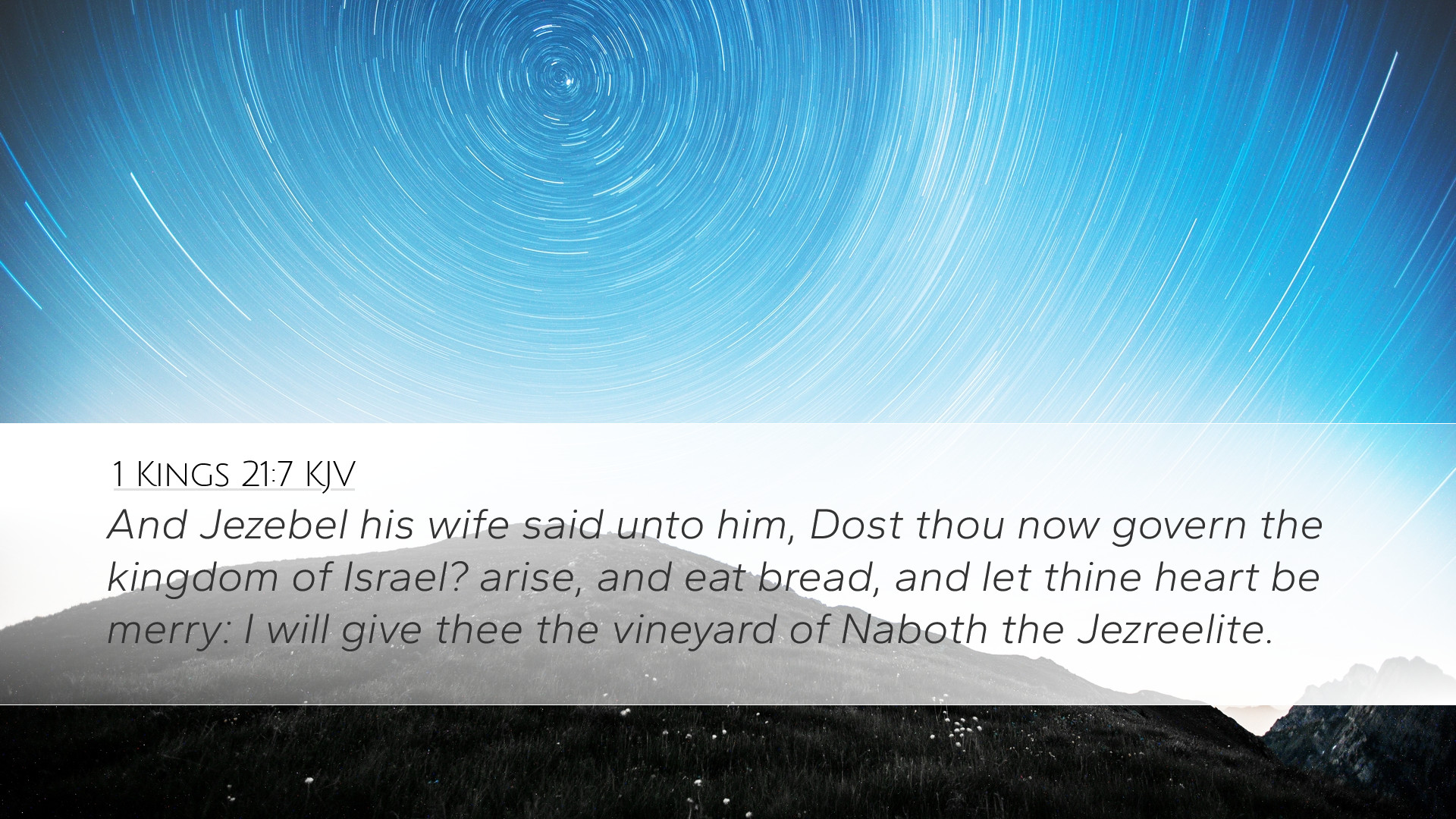Commentary on 1 Kings 21:7
Text of the Verse: "And Jezebel his wife said unto him, Dost thou now govern the kingdom of Israel? Arise, and eat bread, and let thy heart be merry: I will give thee the vineyard of Naboth the Jezreelite."
Introduction
The passage from 1 Kings 21:7 provides a critical insight into the dynamics of power, manipulation, and moral decay seen in the reign of King Ahab and Queen Jezebel. This verse highlights Jezebel's role as a catalyst in a series of events leading to a grave injustice. Various public domain commentaries provide depth to the understanding of this key verse, revealing theological and moral implications that resonate through time.
The Context of the Passage
The story of Naboth's vineyard is set against the backdrop of the Northern Kingdom of Israel, where Ahab reigns as king. The desire of Ahab to possess the vineyard of Naboth is not merely about land; it symbolizes a deeper issue of justice and property rights. Commentators emphasize that Naboth’s refusal to sell his inheritance is grounded in his adherence to God’s law, which dictated that land should not be sold permanently outside the family (Leviticus 25:23).
Women in Power: The Role of Jezebel
Jezebel, a Phoenician princess and wife of Ahab, often symbolizes manipulation and intrigue in Biblical narratives. Her approach to Ahab's sorrow is notably dismissive, indicating a lack of understanding or concern for moral righteousness. Matthew Henry comments, "She endeavoured to harden him, and to embolden him, by putting his grief to shame." This reflects the manipulative nature of her character, showing that she was willing to undermine ethical standards to satisfy her husband's whims.
Ahab's Weakness and the Corruption of Leadership
The verse reveals Ahab's character as well, portraying him as weak and easily influenced. Albert Barnes notes, "This weakness of Ahab’s was the occasion of a great crime in Israel." It illustrates how weak leadership can lead to moral decay in a kingdom. Ahab's inability to confront Jezebel or seek a rightful resolution to his desires emphasizes a critical theme in Hebrew Scriptures: leaders are accountable to God for their actions and decisions.
Theological Implications
This verse also raises theological questions regarding divine justice and human agency. While Ahab holds the authority, it is Jezebel who takes the initiative to violate God’s law. Adam Clarke points out that Ahab's lamentation over Naboth's vineyard ultimately leads to a tragic chain of events that encapsulate God's judgment upon Israel for its idolatry and injustice. The theological themes here run deep: the consequences of sin, the persistence of injustice, and God’s sovereignty in directing human affairs.
Moral Lessons from 1 Kings 21:7
- Integrity in Leadership: The moral fabric of leaders matters. Ahab's lack of moral conviction facilitates Jezebel's ruthless ambition.
- The Cost of Manipulation: Jezebel's actions lead to violence and death. Leaders must avoid unethical shortcuts that may seem expedient.
- Divine Justice: God is aware of injustices, and this passage serves as a warning to nations and individuals about the perils of sin.
- Responsibility in Relationships: Reflect on the impact of one's spouse or close associates. Ahab exemplifies how external influences can lead to moral failure.
Conclusion
In summary, 1 Kings 21:7 encapsulates a pivotal moment in the narrative of Ahab and Jezebel, revealing themes of manipulation, moral weakness, and the inherent consequences of sin. The insights drawn from public domain commentaries such as those by Matthew Henry, Albert Barnes, and Adam Clarke provide timeless reflections that continue to encourage pastors, students, theologians, and scholars to examine their own lives and leadership practices closely. This passage warns of the dangers of allowing power dynamics to overshadow justice and righteousness within any community or leadership structure.


